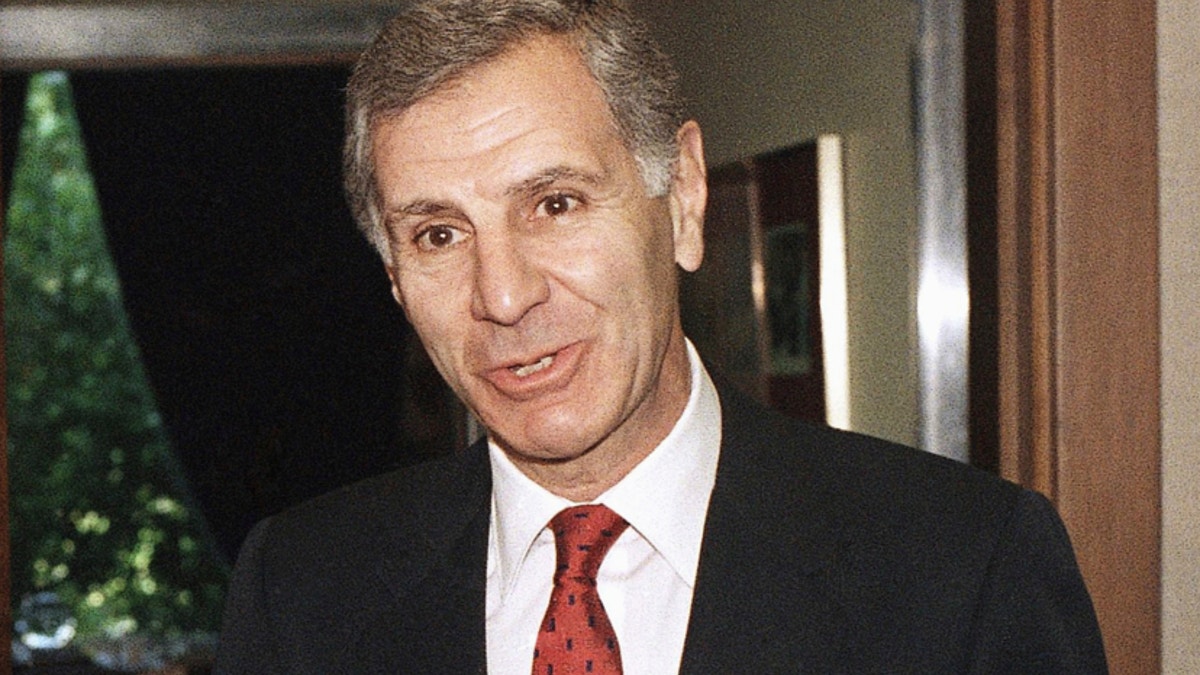
George Deukmejian was governor of California from 1983 to 1991. He died at age 89 on Tuesday, May 8, 2018. (Associated Press)
SACRAMENTO, Calif. – Two-term California Gov. George Deukmejian, whose anti-spending credo earned him the nickname "The Iron Duke," died Tuesday of natural causes. He was 89.
The Republican spent three decades in California politics as an assemblyman, senator, state attorney general and governor. He was elected as the state's 35th governor in 1982 when a massive absentee voting campaign edged him just ahead of Los Angeles Mayor Tom Bradley.
"It was a real comeback," said Ken Khachigian, a longtime friend of Deukmejian who recalled the governor-elect celebrating his win with a bowl of his favorite ice cream.
As governor from 1983 to 1991, Deukmejian ran a law-and-order administration expanding the state prison system, bringing the left-leaning California Supreme Court to the center and supporting tough, anti-crime legislation.
Despite a few notable exceptions, Deukmejian made his opposition to new taxes and increased government spending a focus of his political career. His favorite phrase was "commonsense," which in many cases translated into "cut" or "stop."
He earned the nickname "The Iron Duke" from his Republican supporters in the Legislature for his willingness to veto spending proposals. He issued thousands of vetoes during his two terms, said Steve Merksamer, who worked as Deukmejian's gubernatorial chief of staff.
Merksamer described the former governor as "decent, humble and gracious" and someone who "demanded honesty and integrity."
Republican Pete Wilson described Deukmejian as a dear friend who encouraged him to run for his first political office. Wilson, who succeeded Deukmejian as governor, said they shared many of the same values, including a commitment to public safety and fiscal responsibility.
"While he was a gracious and gentlemanly and almost courtly person, he was very determined to achieve his goals and very effective," Wilson said.
After he eliminated a $1.5 billion deficit, Deukmejian declared in a State of the State address that he had "taken California from I-O-U to A-OK."
But his reputation for prudent fiscal management was based in part on the robust national economy of that time. In the final months of his administration, a nationwide economic slowdown eroded state tax receipts, leaving his successor with a deficit greater than the one Deukmejian inherited from Democrat Jerry Brown.
Brown, who returned to serve as governor in 2011, remembered Deukmejian as a popular governor who "made friends across the political aisle."
Deukmejian was born June 6, 1928, to Armenian immigrants in Menands, New York. He graduated from Siena College in 1949 with a degree in sociology then worked his way through St. John's University, earning his law degree in 1952.
He later moved to California, where he married Gloria Saatjian, also the child of Armenian immigrants.
Deukmejian was seen as a hero among young Armenians in politics, Khachigian said.
It was his family's experience during the mass killing of Armenians by Ottoman Turks around the time of World War I that helped inspire Deukmejian to back efforts to divest California's pension funds and university system from companies doing business with South Africa during apartheid.
The move came a year after Deukmejian vetoed a less aggressive divestment bill and Democratic critics accused him of switching his position for political gain as he sought re-election.
Merksamer said Deukmejian's act was deeply personal and recalled it as his "best moment" in their years working together.
"This was an act of enormous political courage," he said.
He was known as one of the Legislature's most productive authors of law-and-order bills. During his 16 years as a state lawmaker, he wrote more than 100 bills, including a 1975 law known as "use a gun, go to prison" because it required prison time for anyone who used a gun during the commission of a crime.
Deukmejian's anti-crime stance dated back to his childhood when he lived next to the police and fire departments.
"I just started out with a very close, friendly relationship to people in law enforcement. If I had grown up believing, as some young people do, that law enforcement is against people, I probably would have a different attitude," he told The Associated Press.
Deukmejian led the largest prison expansion platform in state history. During his time in office, he brought the number of state prisons from 12 to 28.
As a state senator from Long Beach, he led the move to reinstate California's death penalty.
Deukmejian drafted a 1977 law that legalized the death penalty in California. It passed in the Legislature, but then-Gov. Brown refused to sign it — so Deukmejian headed one of the few successful overrides of a governor's veto in state history.
After he left the governor's office, Deukmejian largely stepped back from politics, Khachigian said. When the two friends got together, rather than talking politics, they spoke about interests they shared, such as their work with a project to provide eye care to children in need in Armenia.
This story contains biographical material assembled by former AP reporter Anna Oberthur. AP journalists Sophia Bollag and Don Thompson also contributed reporting.











































